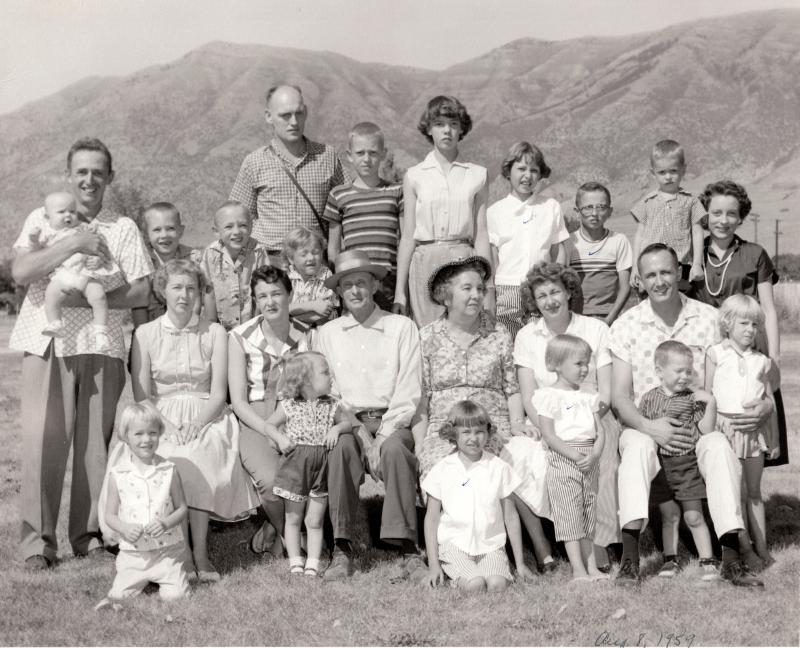(Talk given by Naamon Buckmiller, a nephew, at Abinadi Tolman’s funeral. August 29, 1973. Contributed by Jeri Moon Lott).
As I look over the years many fond memories come to my mind. As I look at Aunt Ellis today and my cousins, Ona, Dawn, Ila, and Roy, I can’t help but think in my mind’s eye many years ago as we associated with them in their home. One of the highlights of my life as a child and a young man was to come to Honeyville. We always looked forward to it without fail. You know, Uncle Bin had a special way with boys, I am sure with girls too, but he just seemed to know what to do with us, how to teach us.
One of the very first things I thought about when my wife told me I was to speak was the wonderful melons and apples and other fruit which he used to raise. As a young lad I could think of nothing better. I remember staying one summer for a few days at Grandma Tolman’s and I wandered up to Uncle Bin’s house because I was always interested in those melons. He made me a proposition that day. To the south of the house there was a long strip of high weeds, and as I remember about 6 to 8 feet wide, between the lawn and the fence. And he said, “If you will pull those weeds I will give you a watermelon for every patch you pull between the fence posts.” I had to be less than 12 because that was when my grandmother died. But I thought that was about the best proposition I had ever received and I went to work. I only remember completing one section between posts, but at the end of that time he came and inspected it and he said, “Okay that is fine, now you can go out into the patch and pick any watermelon you want.” As a normal boy with eyes bigger than his stomach, I found the biggest one in the patch and started for grandma’s house. You can imagine that before I got there I wished I had picked a smaller one. It was pretty heavy.
I can’t help but remember Uncle Bin’s contagious smile and laugh and his wonderful sense of humor. I talked to my mother about him naturally after I heard of his passing and she said, “Yes, he always had a joke to tell.” She wanted to make sure that I knew, and I already knew, that those jokes were always of the highest caliber. He was a great man. He was a great lover of dogs. I can’t help but mention this – mother told me about what she called the “bear dinner”. It seems that Uncle Bin and Uncle Trum had taken a bear in the mountains east of Honeyville and they had planned a dinner and to serve their guests this bear meat, but to call it beef. To make a long story short, everyone thoroughly enjoyed the dinner until they released the information after the dinner what they had been eating.
Another episode mother mentioned was in regards to Uncle Trum and Aunt Bee’s first son. It seems they couldn’t decide on a name and so when they asked Uncle Bin to officiate in the blessing of their child, they also told him that they would like him to pick a name and that they would go along with it. Mother says that she was quite sure that Aunt Bee hadn’t expected “Ammon Abinadi”. Mother also told me of his love for his own name and especially for his namesake. We all know of the great prophet Abinadi in the Book of Mormon and as I was reading last night in the book, I couldn’t help wondering how many times Uncle Bin had read that himself. He was a great scriptorian and I knew having filled two missions, having been a bishop twice, High Counselor and so forth, he must have read those scriptures many times.
When my wife heard the news of his passing it brought to mind to her a very appropriate poem, by Helen Steiner Rice. It is entitled, “How Great the Yield From a Fertile Field.”
“The farmer plows through the fields of green and the blades of the plow are sharp and clean. But the seed must be sown to bring forth grain for nothing is born without suffering and pain. And God never plows in the soul of man without intention and purpose and plan. So whenever you feel the plow’s sharp blade, let not your heart be sorely afraid, for like the farmer, God chooses a field from which he expects an excellent yield. So rejoice though your heart is broken in two. God seeks to bring forth a rich harvest in you.”
Uncle Bin was a man of great courage. I think most of you knew that. There were many stories that I could tell having talked to mother, but I can’t take time. We also know that he and Aunt Ellis were faithful Latter-Day-Saints all the days of their lives. Aunt Ellis still is, of course. And this is born out, I am sure, when we realize the fact that each of these children have been sealed in the Temple. Aunt Ellis, these last years have been difficult for you I am sure. I talked to my father also. Namely because he was associated very closely with Uncle Bin for a period of 40 years or more. And when I called him he asked me if he could think about it for a little while. When I went to see him the next day, he gave me some notes. I certainly won’t read them all but I think you would be interested in a few excerpts.
“Abinadi Tolman was a great man. He placed human dignity and decency above all relations with his fellow men. I first knew Bin when I was 18 or 19 years old. He was a great lover of the outdoors and we enjoyed many trips to the mountains on the deer hunts. Bin also had another love, that was prospecting. He was a great geologist of no small import as he had read much and experienced even more. Bin was one of the comparatively few men I was closely attached to, and he was a real friend, loyal and true. He also was a great horticulturist, growing the finest fruit and also wonderful melons. Apples were his specialty, black cherries too. Bin was a man of high ideals and habits, a man of culture and refinement, a real gentleman and a man who honored his Priesthood and exercised it to the highest degree when for righteousness and for good. God bless his memory and pour his blessings on his fine family. My kindest regards and best wishes to them, with love and respect to them all, Steve.”
His spirit is free and it’s happy, I’m sure. I think we all agree that he is where he is now happy. God bless you and keep you until that time comes when you will join him.
Visit FamilySearch to learn more about Abinadi Tolman and other ancestors. Also visit the Thomas Tolman Family Organization to find out how you can get more involved in family history.
Related Stories
Autobiography of Abinadi Tolman


